BW Interview: Emma Slade Gave Up a Career in Finance to Become A Buddhist Nun After a Traumatic Incident; She Went On to Author Set Free and to Spearhead Fundraising for Special Needs Children in Bhutan
“The man with the gun pushed me down onto the carpet. I tried to cower to make my body curl smaller, instinctively covering my head. ‘Oh God, please don’t kill me.’ My words clung to my teeth and now my whole body was so cold. All I had left were these words.” — Excerpt from Set Free [1]
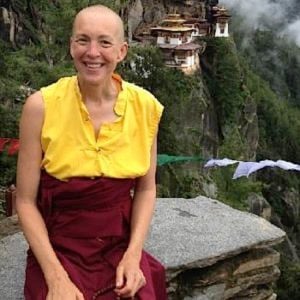
In her penetratingly frank book, Set Free, Emma Slade, describes the ordeal and trauma that led to her awakening. Set Free may begin in trauma, but the book is an inspiring story of “awakening”, especially from the perspective of a Western Buddhist. (See our full interview with Buddhist Nun Emmas Slade below the video.)
She describes in vivid detail the trauma of a personal attack, enduring post traumatic stress disorder, and her search for awakening — which led to a Lama in Bhutan. Today, she is a Buddhist Nun and author who manages an important charity for children with special needs in Bhutan.
An excellent video (Tedx Talk for Youth) introducing the awakening moment of Emma Slade (full transcript below the interview):
Here is our full interview with Emma Slade:
Who was your Buddhist Lama?
My Buddhist Lama is a simple Bhutanese Lama. His name is Lama Nima Tshering and he has completed his nine years of shedra study and four and a half years in retreat. Meeting him was definitely a profound moment in my life and was instrumental in propelling me forwards.
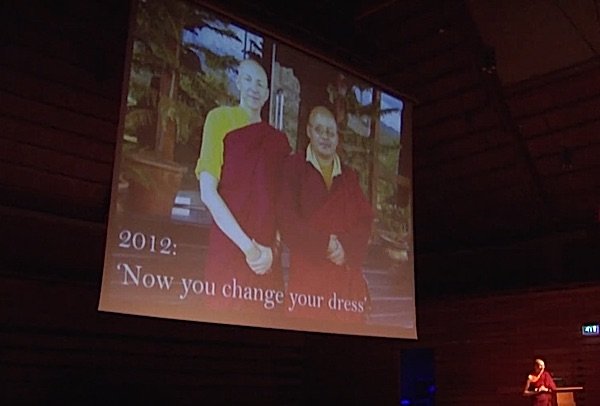
Tell us about a funny or happy memory with your teacher.
There are many described in the book Set Free. I think the relationship between a Bhutanese Lama and an English woman as teacher and student is both touching and very funny. Lama’s English is a lot better since he began teaching me and with more contact with the outside world. His accent can still be interesting. One time he called me when I was back in the UK and said what sounded like ‘If you need me just SMS or porn me’..hilarious I think the PH sound is tricky for his tongue!
On the advice of your teacher you gave up lay life. Are you a nun?
Yes I am a nun and have dedicated myself to helping others. It was my Lama’s instruction to me that I became a nun and I was ordained in Punakha Dzong in Bhutan.
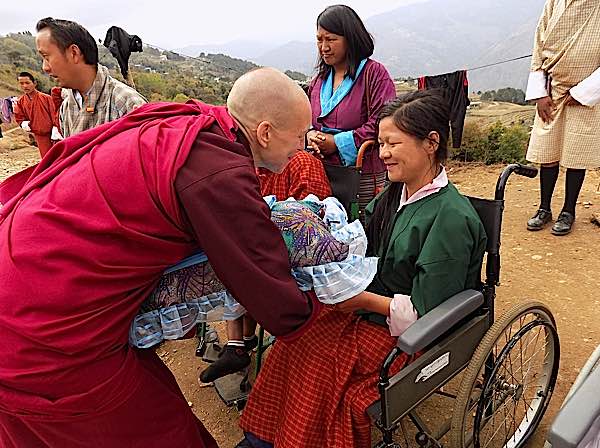
Do you ever work with other people who suffered through PTSD?
No but I think this would be a very great area of interest. I do work one on one with people in various types of difficult.
If it’s okay to speak of it, what are your main focuses of practice?
Having completed my initial 440,000 practices of ngondro I am concentrating on doing compassion in action until my next teacher comes out of retreat. I have always felt a strong pull to the mantra of Chenrezig and the study of compassion continues to be my main interest.
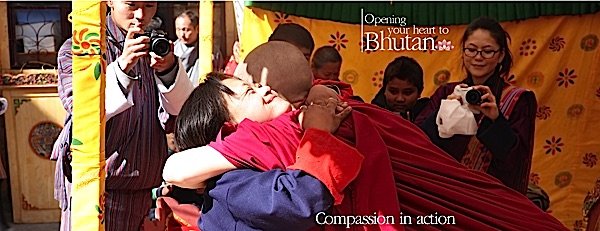
What is ” Opening Your Heart to Bhutan”?
Opening Your Heart to Bhutan is a registered UK charity which I founded in 2015. It is dedicated to helping children in rural Bhutan in practical ways, particularly children with special needs who might otherwise struggle to get access to education or medical help. All details of our work can be found at www.openingyourhearttobhutan.com
Your book Set Free is the story of your awakening and your work with the children of Bhutan?
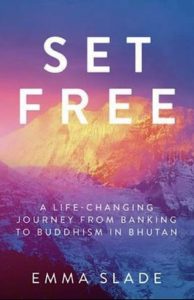
Yes it is hopefully an inspirational book, particularly for anyone interested in both the West and the East and the question of combining spirituality with everyday life.
All profits from the book are being donated to the charity Opening Your Heart to Bhutan. Where can people buy your book?
You can order it through Amazon UK in kindle or paperback form at present and we hope to have it published in the US and Canada soon. More information on the book and events to do with it can be found at www.emmaslade.com
Transcript of Video (January 2017 Tedx Talk)
“You’re cowering on the floor. Above you is an unknown man. He’s pointing a gun at your head. He has your life in his hands.
What matters to you now? What do you know which is of any use?
This is the situation I found myself in, in September 1997, in a hotel room in Jakarta, Indonesia. I believe it was the start of my awakening.
At the time of this incident, I was working in the financial markets in Hong Kong, making significant size investments for a global bank. I had made the decision to move into a financial career after the death of my father. He had always felt that I would suit such a career. And so, I finished my studies in fine arts, and decided to grow up and get a proper job.
And I loved it! It was fast, it was exciting. I had placements in New York, London, HongKong. I ate balance sheets for breakfast, I wore high heels, and I walked with a wiggle. And then came Jakarta.
As the door opened, I took my chance and I ran. And my body escaped. But in the days that followed, I began to suffer from, what I was later to discover, was post-traumatic stress disorder. In this condition, the past and the present know no difference. So, I would be sitting in my office in Hong Kong, looking at balance sheets, as I could smell his skin against my body. As I could hear his shoes, moving back and forth towards me.
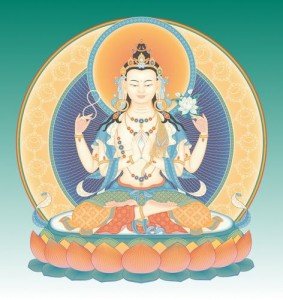
In the yogic and Buddhist tradition, we have a metaphor for the development of a human being, the total development of a human being. And it’s that of the lotus flower. Now, the lotus flower begins in the mud in the base of a lake. And from there it grows up, up, up, up, looking for light, looking for the sun and the surface of the water.
Jakarta was my mud. But it was also the seed of my future development. As I lay cowering on the floor, I knew the preciousness of a human life. And I knew its impermanence. Also, a seed of compassion was planted, which I’ll explain.
As I left and I ran out and down the corridor, behind me, armed men ran into the room. There was much gunfire. And later on, that evening, when I sat down with the police, they showed me a photograph of the man and he was slumped against the hotel wall, in his underpants.
And around him were splatters of blood, everywhere. They were very pleased to show me this photograph, and I looked at it, and felt such sorrow. Such sorrow for this man. Such sorrow for this situation. And this moment, and this feeling, out of all of these moments and all of these feelings, is the one I don’t forget.
Now, back in England I had help to recover from post traumatic stress disorder. And once I had recovered enough to see my life clearly, I felt that I had been treating it very superficially. After this experience I felt I had to inquire more deeply into what it is to be a human being. What the potential of a human being might be.
So I resigned my job, and I stumbled across yoga. I found I was naturally very adept at yoga. I pursued it, enjoyed it, and it helped me bring trust in myself and the world again. At the same time, I began to look at a long held interest in the nature of mind, particularly as described in Buddhist practice.
This is the reclining Buddha of my grandfather [refers to picture on screen]. It was always, as a child, in our home… I wanted always to have near me. It’s still with me now. As a result of this interest in Buddhism, I visited a Buddhist monastery. And I heard, in that Buddhist monastery, this mantra. It’s called the mantra of compassion. You hear it and see it all across the Himalayas. And when I heard this mantra it really touched something in me, something very deep in me. Very deep in me, I think!
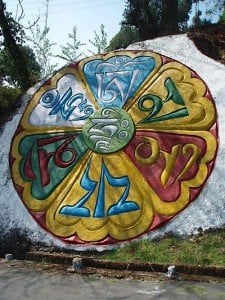
There are many ways to say this mantra, and at the risk of being a spiritual X-Factor, I’m going to show you the way I like to say it:
[SINGS: Om Mani Padme Hum Hrih, Om Mani Padme Hum Hrih.]
I continued to teach yoga and meditation and investigate Buddhism for many years. And then I probably reached some kind of ceiling here in the west. But I was lucky enough to go to Bhutan, the Himalayan kingdom of Bhutan in 2011. When I went there — it was somewhere I wanted to go for a long time — when I went there, I met a monk in a temple. Something very profound happened. And, I returned to England, but then decided to go back to Bhutan to find him, because something had happened there. So I returned to find him, and discovered he’s a Lama.
A Lama in Bhutan is someone who must have done at least three years, three months, three weeks solitary retreat. So, he’s someone who is specialized in the nature of mind. It was obvious he was my teacher and I was his student. After that, things went very fast.
Here’s my Lama (laughs) [refers to picture of Lama and herself on screen, labeled “2012: Now you change your dress.”] Then, out of the blue, he said, “Now you change your dress. He was telling me to become a Buddhist nun. To give up lay occupations. To become celibate. And to train my mind for the benefit of others. I was amazed that he suggested it. And, of course, said yes. (Laughs.)
So, I began the preliminary practices and training of a nun. Many prayers, many meditations. I began to study the language of Tibet…
All that compassion practice, those mantras, they had affected me. I wanted to give back to Bhutan, the country I loved so much. And I also wanted to put my wish to be a compassionate person into action. So, in 2015, I founded this U.K. charity, Opening Your Heart to Bhutan. This is a favourite thing of mine, to be with the children we help.
This is in Wangchuk in Bhutan. [Refers to photo of her with a child.] He has cerebral palsy, and he is an artist. I’m there looking at his art work with him. This is another child in East Bhutan who just spontaneously gave me a big hug. This child is actually blind. [Refers to anther photo of her with a child, hugging.] This is really why I do what I do, in far reaching places like Bhutan. Bringing practical help, medical supplies etcetera to children who need my help.
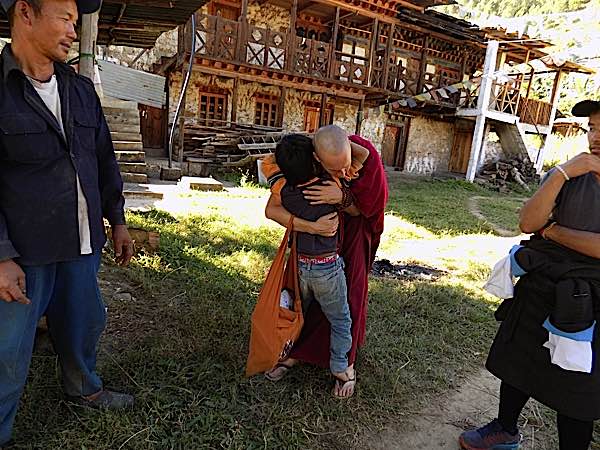
It’s ironic now, that my financial training, is of great help in running a U.K. charity. Running many projects in Bhutan. Organizing many people. The costing of things. Inquiring about how to achieve things on the ground. So, the skills of old have been very useful now in bringing me now, a very meaningful and happy life.
In terms of your own process of awakening, I would really like to share with you, that your life is in your hands, but you should ask, what matters to you now? What do you know which is of any use?
More of what I know is here [refers to slide of her book “Set Free” and another slide with address of www.openingyourheartobhutan.com] and here. Thank you very much.
[Applause]
About Opening Your Heart to Bhutan
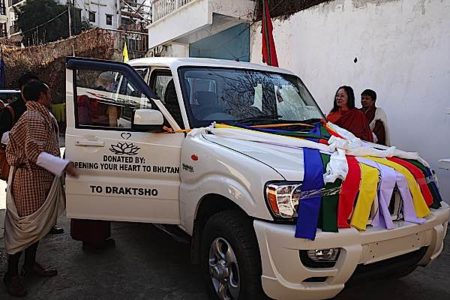
Opening Your Heart to Bhutan is a UK based charity which brings children with special needs joy and the opportunity to build meaningful lives.
Through simple, practical acts of compassion, the charity provides access to safe medical care, disability aids and basic amenities in the isolated rural areas of east Bhutan. It believes in education as an means of empowerment and supports the digging sewage systems, building of hostels and improvment of facilities at Drats-ko, a vocational training centre in Tashigang.
The charity is run by Emma Slade, a buddhist nun who travels regularly to the country to assess needs on-the-ground and supports network of local people who work with families as they grow .
No one is paid to run the charity and costs are kept at a bare minimum to maximise funds going directly to those most in need.
Five Year Plan for Opening Your Heart to Bhutan (pdf)>>
NOTES
[1] Set Free, Emma Slade, Summersdale (13 April 2017) ISBN-10: 184953960X ISBN-13: 978-1849539609, 320 pages. Available on Amazon as Paper or Kindle in April 2017.
1 thought on “BW Interview: Emma Slade Gave Up a Career in Finance to Become A Buddhist Nun After a Traumatic Incident; She Went On to Author Set Free and to Spearhead Fundraising for Special Needs Children in Bhutan”
Leave a Comment
More articles by this author

Five Wisdom Dakinis: “The source of the five activities is the dakini” —Padmasambhava: full feature, documentary video and more

Chintachakra White Wish-Granting Wheel Tara: The All-in-One Mother of Buddhas in Vajrayana Buddhism – Her Significance, Mantra and Why Her Practice is Essential

Tara Teaching from His Holiness the Sakya Trichen: Interview Q & A: Do you have a Tara Question? Chances are His Holiness Already Answered…
Search
Latest Features
Please support the "Spread the Dharma" mission as one of our heroic Dharma Supporting Members, or with a one-time donation.
Please Help Support the “Spread the Dharma” Mission!

Be a part of the noble mission as a supporting member or a patron, or a volunteer contributor of content.
The power of Dharma to help sentient beings, in part, lies in ensuring access to Buddha’s precious Dharma — the mission of Buddha Weekly. We can’t do it without you!
A non-profit association since 2007, Buddha Weekly published many feature articles, videos, and, podcasts. Please consider supporting the mission to preserve and “Spread the Dharma." Your support as either a patron or a supporting member helps defray the high costs of producing quality Dharma content. Thank you! Learn more here, or become one of our super karma heroes on Patreon.
Lee Kane
Author | Buddha Weekly
Lee Kane is the editor of Buddha Weekly, since 2007. His main focuses as a writer are mindfulness techniques, meditation, Dharma and Sutra commentaries, Buddhist practices, international perspectives and traditions, Vajrayana, Mahayana, Zen. He also covers various events.
Lee also contributes as a writer to various other online magazines and blogs.











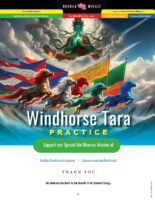
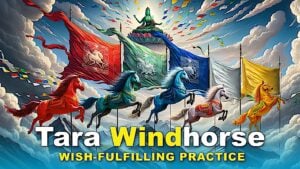



Emma SLADE is one kindest soul I met in 2011 in Pema Chholing Nunnery in Tang, Bumthang.